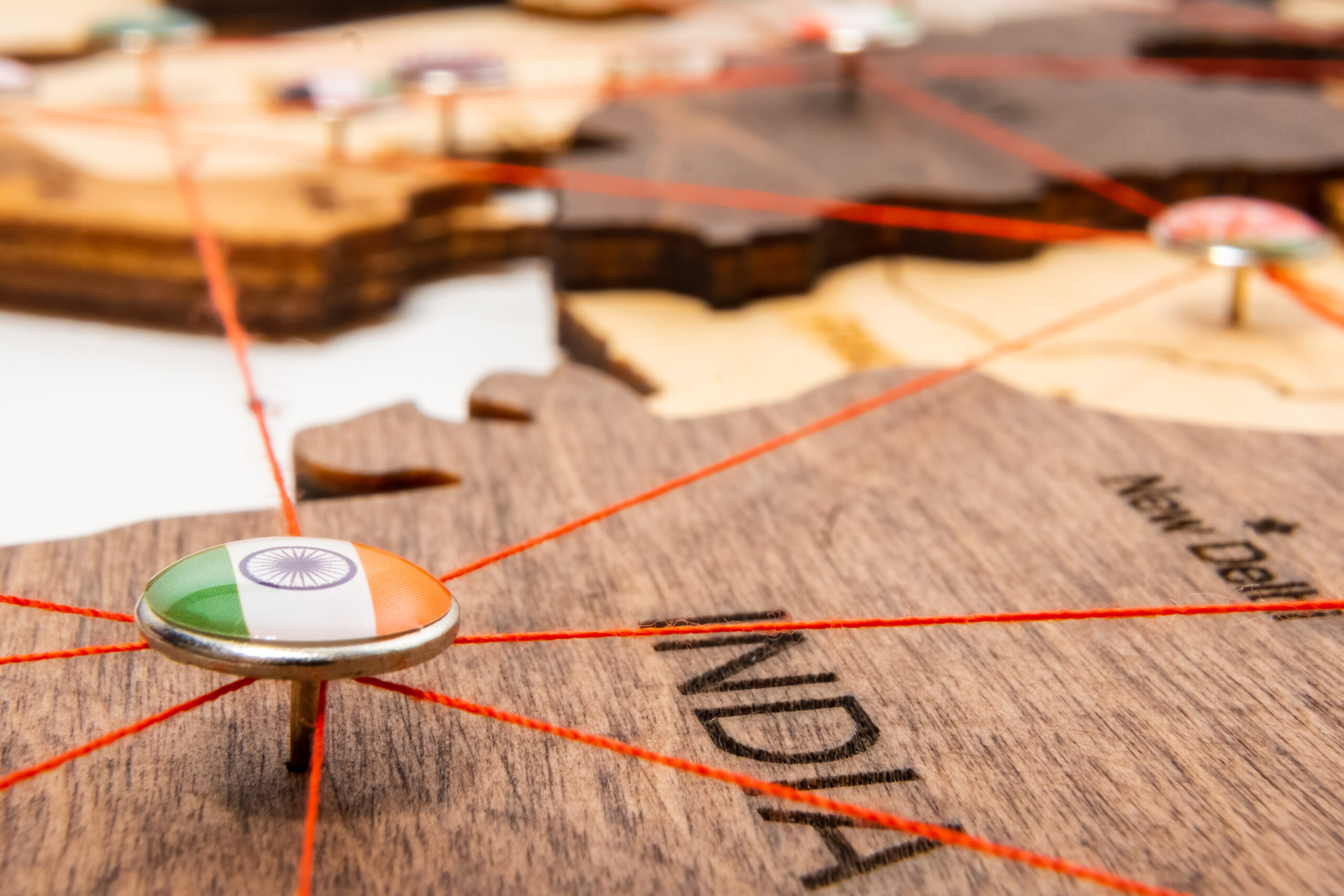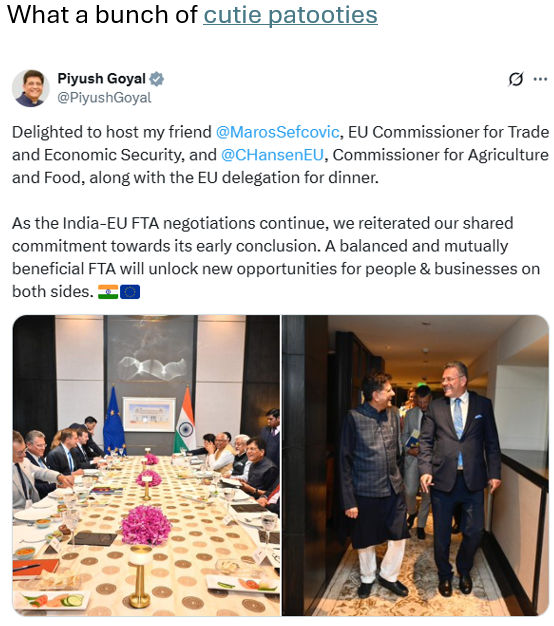September was a busy month for EU trade relations, and even more for the #Tradeviews team. In this edition, we bring to you all the latest developments on the conclusions of negotiations for an EU-Indonesia agreement, Brussels’ tumultuous path towards securing FTAs with India and Australia, a proposal to delay the EUDR (once again), and the European Commission’s plan to impose new tariffs on Israel.
“Jakarta is well worth some palm oil”
On 23 September the European Union and Indonesia finalised negotiations for the Comprehensive Economic Partnership Agreement (CEPA) and for an Investment Protection Agreement (IPA). Trade Commissioner Maroš Šefčovič’s efforts to diversify the EU trade partners have successfully unlocked a deal on hold since 2016.
While the text is yet to be published, the Commission shared that the CEPA will eliminate 98.5% of current tariffs, facilitating exports of EU agricultural products, machinery, chemicals, and automotive parts, which will become tariff-free within five years of its entry into force. The deal will also remove trade barriers on raw materials, granting stable and predictable access to resources such as nickel and cobalt for European industries. Meanwhile, Indonesian businesses will benefit from easier access in sectors such as textiles, footwear and palm oil.
It was precisely palm oil exports from Indonesia that hindered negotiations in the last years, due to concerns over deforestation practices. But these concerns have now been dismissed, as the EU prepares for more palm oil imports and proposes a one-year delay to its Deforestation Regulation – more on that below. However, the palm oil saga is not settled yet, as this week the EU has appealed a WTO ruling that struck down its tariffs on Indonesian palm oil, irritating Jakarta. What a week, huh?
The other agreement reached by the EU and Indonesia is the IPA. The agreement, which has nothing to do with beer, establishes bilateral safeguards for investments and is the first of its kind in EU trade history.
The Commission will now submit the agreement to the Council for adoption and signature, and later to Parliament for approval. In the meantime, we are sure, Commissioner Šefčovič will be getting ready for yet another exotic trip: Australia perhaps? Don’t worry, we will make sure to let you know on #TradeViews.
Our Take
Trade-wise, Indonesia was the 5th biggest ASEAN-partner of the EU in 2024. While the agreement does not carry the same weight as others (read: as the Mercosur agreement), it opens up interesting opportunities and legal certainty for European companies that are looking to expand their businesses in Asia.
Zoom In
The IPA is the first trade deal struck by the EU to ensure investment protection. It introduces a dispute resolution mechanism to ensure the removal of inconsistent measures to provide strong safeguards and a predictable business climate for investors.
Zoom Out
The overall trade partnership, worth €27.3 billion in 2024, will facilitate accession for EU enterprises to a market of 280 million people. While Indonesia’s $30-billion-a-year palm oil industry may expand decisively in Europe, concerns about deforestation remain.
I promise, EUDR, just one more postponement
The odyssey on the EU Deforestation Regulation (EUDR) just keeps on going. On 23 September, Environment Commissioner Jessika Roswall announced that the Commission is considering postponing the application of the EUDR to December 2026. Roswall revealed the postponement in a letter sent to MEP Antonio Decaro, Chair of the ENVI Committee, and to Danish Environment Minister Magnus Heunicke. This would be the second time in one year that the Commission postponed the application of the EU anti-deforestation rule, originally supposed to apply from December 2024, and currently set to take effect as of this December.
According to the Commission, this time, the proposed delay would be due to a glitch in the IT system for the submission of due diligence statements by companies, required by the Regulation, which is reportedly not ready to withstand the inflow of data expected as of 1 January 2026. However, a Commission spokesperson told reporters that the original deadline for the application of the regulation could not be met without leading to disruptions to supply chains.

Reactions have been mixed. The EPP Group, a strong advocate for delaying the legislation, swiftly welcomed the Commission’s proposal. On the other side, Teresa Ribera, Commission Vice President for a Clean, Just, and Competitive Transition, called for Brussels to solve the IT issues without re-opening the Regulation. Several MEPs also blamed the proposal on pressure from third countries. Green MEP Marie Touissant argued that the proposed postponement relates to the end of trade negotiations with between the EU and Indonesia, a key producer of goods covered by the EUDR, while S&D MEP Delara Burkhardt instead questioned whether Brussels had given in to Donald Trump’s request for deregulation. Both allegations have been rejected by Roswall.
Final rush of EU-India talks
While the EU and India are hoping to conclude trade negotiations by the end of the year – a goal further underlined in the New Strategic EU-India Agenda –, talks with New Delhi are proving much more complicated than anticipated. While both parties are animated by a desire to diversify their trade relations as a response to US President Donald Trump’s trade policies, technical difficulties and India’s tight relationship with Russia might lead to significant hiccups.
Indeed, India remains a particularly active supporter of Moscow. In September, it sent troops to take part in the Russian-led Zapad military drills, which simulated a nuclear attack on NATO countries. According to anonymous EU diplomats, by negotiating with India, Brussels is hoping to prevent the country from strengthening ties with more hostile foreign powers and to fill the gap left by the US.

Mark of visiting places and planning of vacation and travel routes. Moreover, several contentious points remain on a number of key sectors, including cars and car parts as well as agricultural products – disagreements on the latter led to the halt of the previous EU-India negotiations. On top of that, New Delhi is reportedly taking issue with EU sustainability policies, notably the CBAM, and contests making the sustainable development chapter of the agreement binding through a dispute settlement mechanism.
The next round of negotiations will take place between 6 and 10 October. Make sure to follow #Tradeviews to be always up to date.
EU-Australia talks: damaged, but not broken
As we’ve covered the EU-Australia trade negotiations before, you might remember the breakdown of negotiations back in 2023. It was a story we know all too well – European farmers didn’t want to budge on market access for Australian beef, lamb, dairy and wine. This is remains the case. But a deal with Canberra would majorly help Brussels reduce dependence on Chinese rare earths – in an era where “strategic autonomy” and “sovereignty” rule the agenda, that’s a major pull factor. Not to mention the EU’s FTAs with other countries in the Pacific, which a deal with Australia would nicely complement. It’s not easy to go back to the negotiating table, though. The EU’s Šefčovič and his counterpart, Trade and Tourism Minister Don Farrell, have found themselves in the same room thanks to ministerial meetings in ASEAN. For now, EU officials are unable to tell what it would take to revive the deal – more technical discussions or new commercial incentives. But a visit to Australia in November could help.
The EU punishes Israel with tariff measures
It may be driven by politics, but the potential economic fallout for Israel could be substantial. Following President Ursula Von der Leyen’s State of the Union address, the Commission has unveiled plans to impose tariffs on €5.8 billion worth of Israeli goods. This represents 37% of Israel’s total exports to the EU (estimated at €16 billion in 2024), covering key sectors such as machinery and transport equipment (43.9%), chemicals (18%), and other manufactured goods (12.1%). The measure still needs the backing of EU member states, although large countries like Germany and Hungary will likely oppose.
At the same time, Brussels plans to freeze €14 million in direct support for Israeli projects, sparing, however, funding for Yad Vashem (Israel’s Holocaust memorial) and for other peace-building initiatives.
Over on X
What a bunch of cutie patooties
Aerial view green pine forest in deforestation area landscape. Top view of european nature from high attitude in autumn season. Drone view. Bird’s eye view a logging zone cuts through forest.
On the radar
14 November | The European Commission will organize the 2025 Export Control Forum, connecting experts from the private sector, academia, and civil society with the executive to discuss the latest on EU and global export control.
20 November | The European Commission will be the venue of the upcoming EU Trade Policy Day. On the agenda, global trade rules, the value of new and old alliances, and economic security.
What we’re reading
Quick, sign the papers!: The EU is reportedly aiming at signing the Mercosur Agreement on 5 December, during a summit in Brazil. According to an indicative timeline circulated with Member States, EU’s ambassadors will weigh in on the agreement on 3 December.
Bail nosotros out: The Trump Administration has decided to support Argentina with a $20 billion financial lifeline to support its currency in the financial markets. However, the announced bailout has not been well received by some of Trump’s more die hard “America First” supporters and Democrats alike. Farmers associations also criticised the decision, as Argentina continues to sell significant quantities of soybeans to China.



